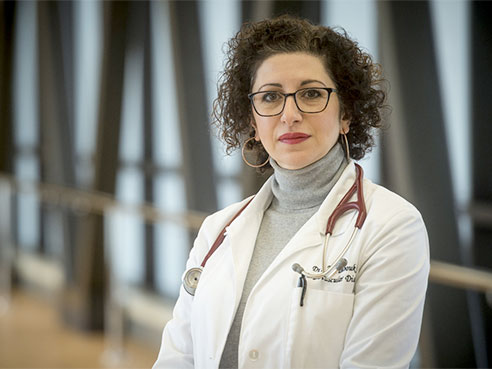 Salpy Pamboukian, Director of the UAB Women’s Heart Health ClinicHeart disease takes the life of one out of every three women and affects about 43 million women in the United States, and doctors at the University of Alabama at Birmingham in the Division of Cardiovascular Disease recently established the UAB Women’s Heart Health Clinic to help provide specialized care for these women.
Salpy Pamboukian, Director of the UAB Women’s Heart Health ClinicHeart disease takes the life of one out of every three women and affects about 43 million women in the United States, and doctors at the University of Alabama at Birmingham in the Division of Cardiovascular Disease recently established the UAB Women’s Heart Health Clinic to help provide specialized care for these women.
Because women have unique risk factors and symptoms, they may need heart care designed to address their needs. Directed by UAB cardiologist Salpy Pamboukian, M.D., the UAB Women’s Heart Health Clinic at The Kirklin Clinic will evaluate and manage women while addressing the distinct concerns of women with heart disease. In collaboration with other renowned UAB cardiac experts like hypertension specialist Suzanne Oparil, M.D., and interventional cardiologist Brigitta Brott, M.D., women will have full access to UAB Cardiology’s diagnostic and therapeutic services.
Women typically experience different symptoms from men during heart attacks. Symptoms include sweating, pressure, nausea and jaw pain. These symptoms may often be brushed off as the flu, stress or menopause; but Pamboukian says that, when it comes to heart disease, there is no reason to be passive about these symptoms.
“Despite the fact there is plenty of public information about heart disease, many women are not receiving the message that heart disease is still the top cause of death in the United States,” Pamboukian said. “A lot of women put off getting the kind of medical care they need.”
 The UAB Women’s Heart Health Clinic is located at The Kirklin Clinic.Pamboukian believes there is a lack of understanding in the medical community of how heart disease can affect women.
The UAB Women’s Heart Health Clinic is located at The Kirklin Clinic.Pamboukian believes there is a lack of understanding in the medical community of how heart disease can affect women.
“Whatever the reason, delays in diagnosis give the disease time to advance,” she said.
According to the National Heart, Lung and Blood Institute, 23 percent of women will die within one year after having a heart attack, and within six years of having a heart attack, nearly 46 percent of women become disabled with heart failure. Two-thirds of women who have a heart attack fail to make a full recovery.
Pamboukian says that, for women in midlife, taking action is particularly important. Once a woman reaches menopause, her risks of heart disease and heart attack jump dramatically. One in eight women between the ages of 45 and 64 has some form of heart disease, and this increases to one in four women older than 65.
“We want our clinic to be the entry point for women who need our services,” she said. “Based on what we find in the initial consultation, we will direct the patient to the appropriate testing. If the patient is diagnosed with a heart issue, we will take the next step for treatment.”
The clinic will accept referrals from outside Birmingham to ensure women can get the care they need if services are not available in their area.
“The time is right for a clinic like this in our area,” Pamboukian said.
To schedule an appointment, or to receive more information, please call 205-934-3438.